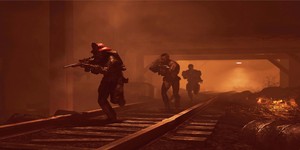
In short, the quality of it doesn't justify the quantity, and its ubiquity impacts upon the game elsewhere. Early on I ran around the wasteland dressed in a postman's uniform, because it gave me a charisma and endurance bonus and I liked the idea of gadding about the wasteland as a shotgun-wielding postie. Eventually though, I ditched my snazzy blue threads and mail satchel to alternate between combat or power armour, simply because it made me more durable. Moreover, the fairly miserly distribution of perk points (10 points initially plus an extra one per-level) mostly end up spent on upping your health and damage output, while more interesting perks, such as mastery over animals, are neglected by necessity.
It's frustrating because, when you get a brief respite from killing, there's plenty else to recommend about Fallout. The writing is improved from Bethesda's previous efforts, particularly the main story, which surprised me on a couple of occasions with its twists and turns and more nuanced, layered characters (Nick Valentine being a particular highlight). And The world itself constantly tugs at your wanderlust - every building from the most dilapidated corner store to vast, labyrinthine manufacturing plants feels worthy of exploration. The joy of a Bethesda game is the balance between the quieter and more action-packed moment, but in Fallout 4 that balance is distinctly off.
There are a couple of other points worth mentioning. Fallout 4 sports a remarkably involved crafting system that lets you construct anything from a simple defence turret to entire buildings. In designated areas, this can be used to establish settlements, including farms, and complex power networks. If you have the right perk, you can even create trading routes between these settlements to bolster your supplies. It's an interesting meta-layer to the game, but one that also feels slightly arbitrary and, a little like the combat, hindered by an engine that isn't designed to support it. Navigating the interface is rather awkward on PC, and there's lots of stuff you can do with it that I didn't realise early on, like reclaiming debris and broken furniture/utilities for scrap.
And of course, no review of a Bethesda game would be complete without a bug report. We didn't experience too many problems in this area, a few clipping issues with ragdolls, and the odd hitch with the crafting system where certain items just couldn't be built without a reload. The only significant issue we encountered was upon exiting the vault for the first time, where we couldn't move at all. This proved to be easily fixable, but it didn't exactly make for a great first impression.
Earlier this year I worried that Fallout 4 would be eclipsed by this year's surprise open-world smashes The Witcher 3 and Metal Gear Solid V. Now that I've played it, however, this no longer concerns me. When it comes to open-world adventuring, Fallout 4 is often just as much fun as those two games, the environment design is astounding, and that ability to just pick a direction and chase the horizon is as appealing as ever.
The difference is that The Witcher 3 and MGS V are both complemented by their system design, whereas Fallout 4 feels like it's constantly fighting against it. It wants to be a punchy, grisly FPS, but is held back by its RPG roots. It wants to be a diverse, create-your-own adventure, but is hindered by the strong combat emphasis. It wants to be a buddy road-trip, but is restrained by systems geared toward a solo RPG experience. Fallout 4 kept the Bethesda flame in my heart, but it didn't set my world on fire.
It's frustrating because, when you get a brief respite from killing, there's plenty else to recommend about Fallout. The writing is improved from Bethesda's previous efforts, particularly the main story, which surprised me on a couple of occasions with its twists and turns and more nuanced, layered characters (Nick Valentine being a particular highlight). And The world itself constantly tugs at your wanderlust - every building from the most dilapidated corner store to vast, labyrinthine manufacturing plants feels worthy of exploration. The joy of a Bethesda game is the balance between the quieter and more action-packed moment, but in Fallout 4 that balance is distinctly off.
There are a couple of other points worth mentioning. Fallout 4 sports a remarkably involved crafting system that lets you construct anything from a simple defence turret to entire buildings. In designated areas, this can be used to establish settlements, including farms, and complex power networks. If you have the right perk, you can even create trading routes between these settlements to bolster your supplies. It's an interesting meta-layer to the game, but one that also feels slightly arbitrary and, a little like the combat, hindered by an engine that isn't designed to support it. Navigating the interface is rather awkward on PC, and there's lots of stuff you can do with it that I didn't realise early on, like reclaiming debris and broken furniture/utilities for scrap.
And of course, no review of a Bethesda game would be complete without a bug report. We didn't experience too many problems in this area, a few clipping issues with ragdolls, and the odd hitch with the crafting system where certain items just couldn't be built without a reload. The only significant issue we encountered was upon exiting the vault for the first time, where we couldn't move at all. This proved to be easily fixable, but it didn't exactly make for a great first impression.
Earlier this year I worried that Fallout 4 would be eclipsed by this year's surprise open-world smashes The Witcher 3 and Metal Gear Solid V. Now that I've played it, however, this no longer concerns me. When it comes to open-world adventuring, Fallout 4 is often just as much fun as those two games, the environment design is astounding, and that ability to just pick a direction and chase the horizon is as appealing as ever.
The difference is that The Witcher 3 and MGS V are both complemented by their system design, whereas Fallout 4 feels like it's constantly fighting against it. It wants to be a punchy, grisly FPS, but is held back by its RPG roots. It wants to be a diverse, create-your-own adventure, but is hindered by the strong combat emphasis. It wants to be a buddy road-trip, but is restrained by systems geared toward a solo RPG experience. Fallout 4 kept the Bethesda flame in my heart, but it didn't set my world on fire.
-
Overall75 / 100


MSI MPG Velox 100R Chassis Review
October 14 2021 | 15:04

![Fallout 4 review [TUESDAY] Fallout 4 Review](http://images.bit-tech.net/content_images/2015/11/fallout-4-review/fallout8-614x345.jpg)
![Fallout 4 review [TUESDAY] Fallout 4 Review](http://images.bit-tech.net/content_images/2015/11/fallout-4-review/fallout9-614x345.jpg)
![Fallout 4 review [TUESDAY] Fallout 4 Review](http://images.bit-tech.net/content_images/2015/11/fallout-4-review/fallout12-614x345.jpg)








Want to comment? Please log in.